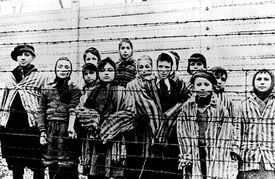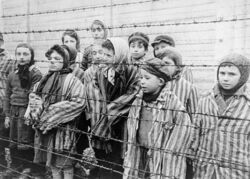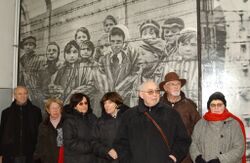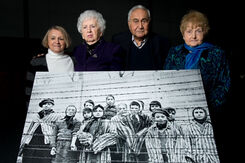Difference between revisions of "Erika Dohan"
| Line 51: | Line 51: | ||
Erika and Otto recuperated in a convent in Katowice, Poland, and later a displaced persons camp until they made their way back to Trnava and reunited with their mother and other family members. Erika met her future husband Karol Dohan in a Jewish community youth group and moved to Israel with him in 1949. They both served in the Israeli Army and were married in 1951. Erika and Karol (who died in 1985) have one son, Ariel, and three grandchildren. | Erika and Otto recuperated in a convent in Katowice, Poland, and later a displaced persons camp until they made their way back to Trnava and reunited with their mother and other family members. Erika met her future husband Karol Dohan in a Jewish community youth group and moved to Israel with him in 1949. They both served in the Israeli Army and were married in 1951. Erika and Karol (who died in 1985) have one son, Ariel, and three grandchildren. | ||
[[Category:Holocaust Children, 1931 (subject)|1931 Dohan]] | |||
[[Category:Auschwitz (subject)|1931 Dohan]] | |||
[[Category:Liberation of Auschwitz (subject)|1931 Dohan]] | |||
Revision as of 14:13, 13 September 2020
Erika Dohan (F / Czechia, 1931)
Biography
Auschwitz Picture
She is present in an iconic Auschwitz picture, that depicts 13 child survivors, shortly after the liberation of the camp. All of them have been identified. From left to right they are:
- (1) Tomy Shacham / Tomy Schwarz (M / Slovakia, 1933)
- (2) Miriam Friedman / Miriam Ziegler (F / Poland, 1933)
- (3) Pessa Balter / Paula Lebovics (F / Poland, 1933)
- (4) Ruth Muschkies / Ruth Webber (F / Poland, 1935)
- (5) Bracha Katz / Berta Weinhaber (F / Slovakia, 1930)
- (6) Erika Dohan / Erika Winter (F / Czechia, 1931)
- (7) Marta Wise / Marta Slonim (F / Slovakia, 1934)
- (8) Eva Slonim / Eva Weiss (F / Slovakia, 1931)
- (9) Gabor Hirsch (M / Poland, 1929)
- (10) Gabriel Neumann / Gabriel Nejman (M / Czechia, 1937-2012)
- (11) Shmuel Schelach / Robert Schlesinger (M / Czechia, 1934-2006)
- (12 & 13) Eva & Miriam Mozes / Eva Kor (F / Romania, 1934-2019) and Miriam Zieger (F / Romania, 1934-1993).
Erika Dohan was among the seven children who reunited on 27 January 2005 in the ceremony in Poland marking 60 years since the liberation of Auschwitz (photograph by Dalit Shacham). The group included (from left to right): Tomy Shacham (1); Erika Dohan (6); Marta Wise (7); Eva Slonim (8); Shmuel Schelach (11); Gabriel Neumann (10); and Bracha Katz (5).
In separate reunion four other survivors gathered in Krakow, Poland on 26 January 2015, at the invitation of the USF Shoah Foundation, on the eve of the 70th anniversary of the liberation of the death camp. The Group included (from left to right): Paula Lebovics (3), Miriam Ziegler (2), Gabor Hirsch (9), and Eva Kor (12). (Photo by Ian Gavan/Getty Images).
USF Holocaust Foundation
Erika Winter Dohan and her family received help from many Gentiles in the first years of the Holocaust, but eventually they, too, ended up at Auschwitz.
The Winter family owned a movie theater in their town of Trnava, Czechoslovakia. Erika, born March 3, 1931, had one younger brother, Otto. She remembers that Jews in the town began losing their businesses when anti-Jewish laws took effect in the late 1930s, but her family was able to keep the movie theater until 1939 or 1940 because it was deemed important for the local economy. However, once the theater was ultimately taken away, her father had to find new work as an accountant.
Erika’s father was friendly with many police officers in the town through his work, and one day, an officer warned him that Jews would be deported that night. Her parents took Erika and Otto to a farm at the end of their street to hide. They stayed for three days and then returned to their apartment. Later that week, police arrived at the house to arrest Erika’s father. They took him to a small collection camp with the rest of the Jewish men from the town, and Erika and her mother went to visit him once. The second time her mother went, he was gone. They never saw him again.
Erika, Otto and their mother joined her mother’s aunt in the home of a Christian family that had agreed to hide Jews for money. But after just over a week, others in the town discovered them and informed the police. Erika and her family were taken first to the Sered concentration camp and from there, to Auschwitz. It was November 1, 1944.
Once they arrived, Erika and the others on the transport were taken to a family camp barrack and allowed to keep their clothes, food and belongings, much to the astonishment of the other inmates. However, this would not last – the women were separated from the children and taken to a camp in Germany after a few days. The night before the women left, Erika’s mother snuck into the children’s barrack to say good bye to Erika and Otto and tell them where to meet up with the family after the war was over.
Once they were on their own, the children lived in the “gypsy” camp, a harsh place with little food. Across from their barrack was a barrack that housed elderly people and women with babies, and there Erika found her great aunt. The people in this barrack got hot cereal, and this great aunt traded her own bread to get cereal for Erika and Otto. But after a while, she disappeared.
In January, as the Soviet Army drew closer, the Germans began evacuating the majority of the camp on death marches to lands that were still under German control. Erika remembers one day the entire camp was forced to stand outside in the snow for hours. She and a friend snuck back into the barrack for a few minutes to get warm, and when they went back out, everyone was gone, most likely to their death on the march. Only a few children and the sick were left. The Red Army liberated Auschwitz-Birkenau on Jan. 27, 1945.
Erika and Otto recuperated in a convent in Katowice, Poland, and later a displaced persons camp until they made their way back to Trnava and reunited with their mother and other family members. Erika met her future husband Karol Dohan in a Jewish community youth group and moved to Israel with him in 1949. They both served in the Israeli Army and were married in 1951. Erika and Karol (who died in 1985) have one son, Ariel, and three grandchildren.



